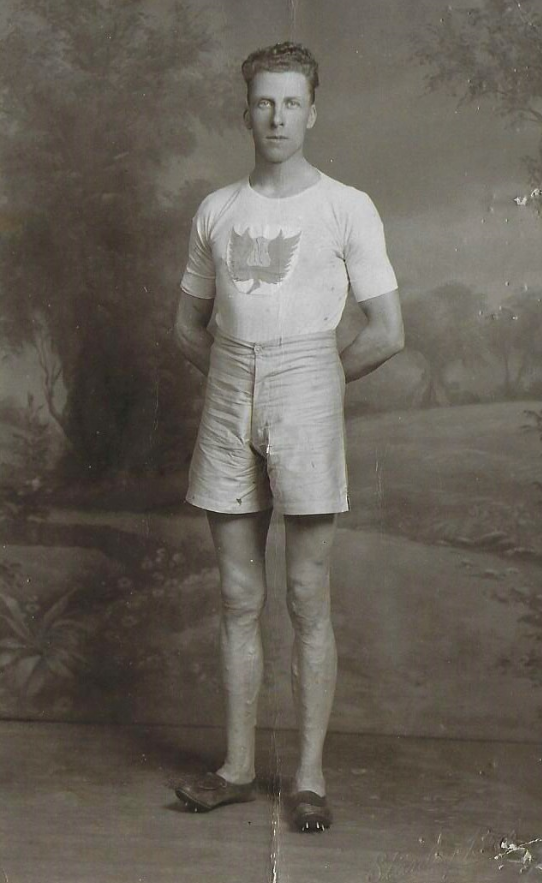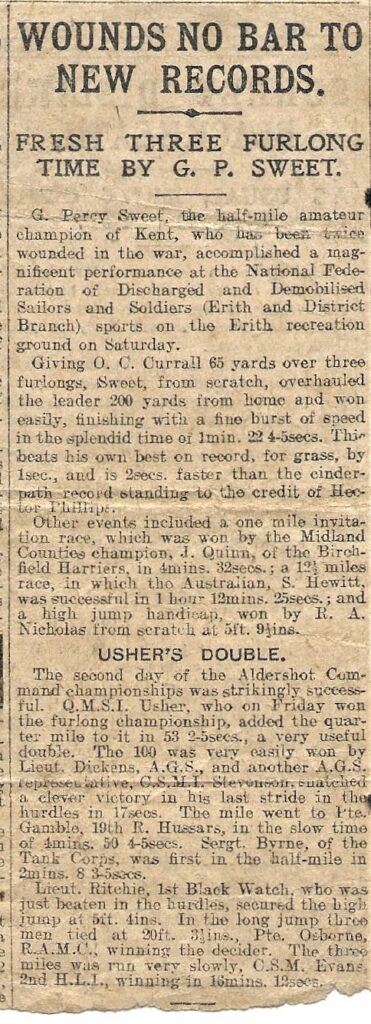
Percy Sweet: a bitter experience on his one and only Great Britain showing
Credit: N.U.T.S.
Percy Sweet has no challenger as the least successful British athlete in the matches against France which took place every year from 1920 to 1939 except when there was an Olympics or war was imminent. In the inaugural contest in Paris on 11 September 1921 he failed to finish in the 1500 metres, and he never represented his country again, but it would be a pity if he was remembered only for that.
He was 32 years of age when he made his brief international debut and swan-song, and he had been competing in handicap races since at least 1909 until the outbreak of World War I. His main event was the 880 yards, in which he was 3rd in the 1919 national Amateur Athletic Association Championships to the future double Olympic gold-medallist, Albert Hill, and the existing World record-holder at 1000 metres, Anatole Bolin, of Sweden. Sweet also raced regularly at 440 yards and the mile, and he had placed 3rd in the latter event in the England-v-Ireland-v Scotland home international in July of 1921.
He was originally selected against France only as a reserve for both the 800 and 1500 metres but was brought in as a replacement for this three-a-side one-day match which, incidentally, was conducted in a fraught atmosphere of ill-will between the respective officials. Fortunately, differences were soon settled, and England, having won 122-118 in Paris, did so again the next year at Stamford Bridge, 57-42. Though described as “England”, the team included a Welshman (Cecil Griffiths) an Anglo-Scot (Robert Lindsay) and two Australians (Wilfred Kent-Hughes and Philip Pitt)! The Stamford Bridge cinder track which surrounded the football pitch had first staged the AAA Championships in 1886 and would do so again every year from 1909 to 1931 except when there was no meeting during the years of World War I.
Guy Percival Sweet was born in Lewisham on 5 November 1888. He later lived in nearby Lee, in Kent, and competed for Kent AC and then for Surrey AC. Like a number of other Surrey AC runners, he was employed in the London shirt factory owned by the club president, Ted Vowles. The medley relay (880 yards x 220 x 220 x 440, but not necessarily in that order) was highly popular and frequently contested in the inter-war years and Sweet was in the club’s team which was 2nd to Polytechnic Harriers in the AAA Championship event in 1914, 1919 and 1921.
He ran the same event – in this instance 880 x 440 x 220 x 220 – for an England team against Canada and New Zealand at the “Empire Day Meeting” on 24 May 1919 at Stamford Bridge, and it was, by all accounts, a thrilling race to watch. The visitors were servicemen still in uniform in Europe and Daniel Mason, for New Zealand, narrowly led Albert Hill on the opening stage in 1:55 2/5, and Sweet raced level in the 440 in 50 4/5 before the NZ team eventually won by a yard in 3:30 3/5.
Another preference of Sweet’s was for the 660 yards, which enjoyed a few years in favour, to the extent that Sweet came to be referred to in the press as “a three-furlong man”. Hector Phillips, a Canadian soldier stationed in England (and a future Olympian in 1920 and 1924), had run 1:19.0 in 1916 and Sweet claimed a rather more modest English record of 1:22 4/5 at the Erith Sports, in Kent, on 26 July 1919. This would be beaten as a British record by Cecil Griffiths, with 1:21 2/5 in 1921, but no one seems to have taken an interest in the distance thereafter. The fastest British time for 600 metres (656.1 yards) is 2:14.95 by Steve Heard in 1991, whose best 800 metres was 1:44.65. Percy Sweet was Kent champion at 880 yards both before and after World War I and had an estimated best time of 1:59 1/5 at those 1919 AAA Championships. He died in Hastings on 10 October 1964, aged 75.


